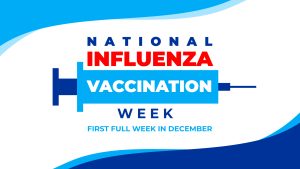It’s National Influenza Vaccination Week, December 5-9
 If you haven’t gotten your flu vaccine, this is the time because it’s National Influenza Vaccination Week.
If you haven’t gotten your flu vaccine, this is the time because it’s National Influenza Vaccination Week.
The annual observance, December 5-9, serves as a reminder for everyone six months and older that there is still time to get vaccinated against flu. This year’s flu season began early and has been more severe. During the week ending November 19, Virginia had a very high level of influenza-like illness. Nationwide, more than 6.2 million illnesses have been reported along with 53,000 hospitalizations and 2,900 deaths.
Vaccination is the best protection against the flu and is particularly important for pregnant women and people who are at higher risk of developing serious flu complications, including young children and people with chronic illness.
Flu viruses are constantly changing and protection from vaccination decreases over time. The vaccine has been proven to reduce the risk of severe illness, hospitalization and death. Complications of flu can include bacterial pneumonia, ear infections, sinus infections and dehydration. Chronic medical conditions such as asthma, congestive heart failure and diabetes could get worse. Flu vaccines can still be beneficial after flu infection to protect against other strains circulating during the flu season.
What are the symptoms of flu to watch for?
- Fever or chills
- Muscle aches
- Cough
- Sore Throat
- Stuffy nose
- Headaches
- Fatigue (feeling very tired)
- Some children may have vomiting and diarrhea
In addition to a flu vaccine, don’t forget that healthy habits such as covering a cough or sneeze, washing your hands and avoiding others who are sick can help keep you from getting the flu. If you are sick, stay home to help keep the virus from spreading.
Check with your healthcare provider, pharmacy or Vaccines.gov today to schedule your vaccine appointment. Vaccines may also be available at your local health department.
